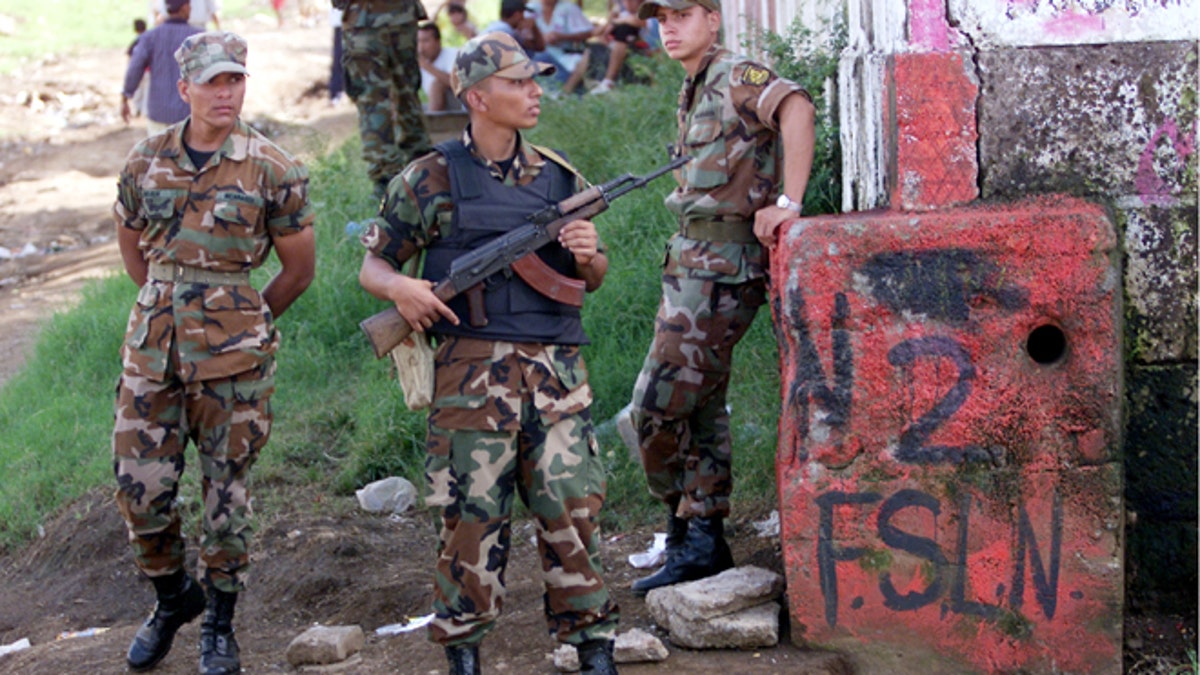
396856 08: Members of the Nicaraguan Armed Forces patrol the streets near a polling station during the presidential elections November 4, 2001 in Managua, Nicaragua. Nicaraguan citizens elected a new president in the country's most closely contested general election between Liberal Party candidate Enrique Bolanos and Sandinista Front leader Daniel Ortega. (Photo by Max Trujillo/Getty Images) ((Photo by Max Trujillo/Getty Images))
Over the last year there has been a great deal of attention paid to the soaring violent crime rates in Central American cities like Honduras’ San Pedro Sula and El Salvador’s San Salvador, but conspicuously left out of the conversation is any city in Nicaragua.
As thousands of migrant flees to the United States from El Salvador, Guatemala and Honduras amid the bloodshed in their countries, Nicaragua – the second poorest nation in the Western hemisphere and a vocal opponent of U.S. influence in the region – has been praised as one of the safest countries in the hemisphere.
Many analysts say that this has to do with the path that the government of President Daniel Ortega has taken to fighting crime in the capital of Managua and other urban areas.
With its neighbors adopting a ‘mano dura’ – or iron fist policy – to security in their countries, Nicaragua has employed a decidedly softer approach in combating crime. In one Managua neighborhood, Dimitrov – a 10 or so square block area that once accounted for 20 percent of all the crime in the city – the government helped drive down violent crime rates by letting the community patrol itself and using police officers mediate talks between gang members.
This approach in part has kept many young people out of jail, with Pedro Argueta, the country’s police commissioner in charge of youth issues, claiming that Nicaragua has just 70 juveniles in jail and that countries like Guatemala and Belize are now following similar tactics.
- Cold-Blooded But Hot For Dinner: With Food Shortages Looming, Nicaragua Eyes The Prehistoric Iguana
- Nicaragua Rescues 22 Of 26 Trapped Gold Miners
- Nicaragua Reveals Route For $40 Billion Inter-Ocean Canal
- Space Oddity: U.S. Experts Question Report Of A Meteorite Strike In Nicaragua
- Construction Of Nicaragua’s Canal To Be Delayed At Least A Year Because Plans Are Incomplete
- Best pix of the week
- Best sports pix of the week
- Teens With Cancer Get Their ‘Quinceañera’ in Nicaragua
Argueta added that the bloodshed that occurred during the country’s bloody civil war in the 1970s has taught the government that strong arm tactics and violence only lead to more violence.
"The repression that we had during the 70s, taught us a lesson," he said. "That when there is repression, there is a reaction."
Some, however, question the idyllic picture that Nicaragua is painting of its security situation; claiming that many of these policies are political tools and used by the left-wing government to spy on any citizens suspected of counter-revolutionary actions.
"Every government agency had a specific role and their primary objective was to defend the revolution," Elvira Cuadra, who has studied Nicaragua's police force for decades, told Al Jazeera.
Still residents of neighborhoods like Dimitrov say they are seeing a change for the better daily on the streets where they live.
"All that shooting, all those deaths, they were part of the war we lived," Dimitrov resident Jorge Sandoval said. "Now, why should we be shooting each other?"
Nicaragua also has been left of lists on a number of reports tracking the most violent nations in the world, while its neighbors have topped or been near the top of nearly all of them.
A recent report, entitled "Other Situations of Violence in the Northern Triangle of Central America," discussed in depth the carnage perpetrated in Guatemala, Honduras and El Salvador by gangs, organized crime and drug traffickers.
"At 90.4 homicides per 100,000 people, Honduras remains the most violent country in the world. El Salvador (41.2) and Guatemala (39.9) have higher homicide rates now than during their civil wars," the report noted
"The homicidal violence in the Northern Triangle results in considerably more civilian casualties than in any other countries, including those with ongoing armed conflicts or war, such as Democratic Republic of the Congo (28.3 in 2012) and Afghanistan (6.5 in 2012). In 2012 the global average homicide rate was 6.2 per 100,000 people," the report said.
Efe contributed to this report.
Follow us on twitter.com/foxnewslatino
Like us at facebook.com/foxnewslatino
